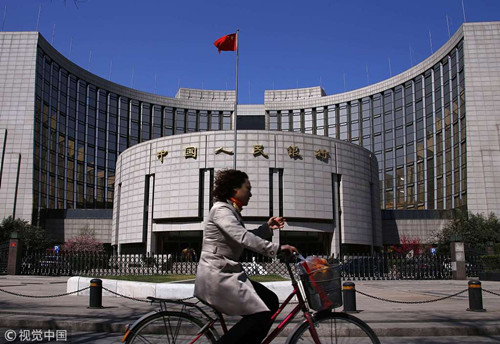Rules on financial holding firms in pipeline


A woman rides past the headquarters of the People's Bank of China in Beijing, April 3, 2014. [Photo/VCG]
China's financial regulators are mulling new rules to regulate the nation's financial holding companies to curb risks originating from their risky and opaque operations.
The drafting of the new rules is being led by the People's Bank of China, the central bank, and the new regulation will likely require financial holding companies to obtain necessary licenses issued by the PBOC to conduct business, according to media reports citing people close to the regulators.
The new rules, which could be issued and implemented this year, will strengthen the regulation and supervision of financial holding companies' capital authenticity and adequacy, shareholding structure, corporate governance and their connection with subsidiaries, according to the reports.
Industry experts said that the new regulation would likely target private groups and financial conglomerates funded by industrial capital.
Growing risks from big financial holding companies have caught the attention of Chinese regulators who are concerned that the risks associated with these big groups could lead to wider systemic financial risks that could jeopardize the overall economy.
Many of the big financial holding companies have complex and opaque shareholding structures and are believed to have conducted risky practices such as excessive borrowing and high capital leverage. Some are even engaged in illegal activities such as fake capital injection and fundraising fraud.
Zeng Gang, director of banking research at the Institute of Finance and Banking of the Chinese Academy of Social Sciences, said it is necessary to address the regulatory void for financial holding companies, especially those that are controlled by industrial capital and local governments.
"Supervision of financial platforms controlled by financial firms is relatively easier because the parent companies are already subject to strict regulation. The risks are less controllable when it comes to financial platforms owned by industrial capital or by local governments. It could be a challenge for the regulators to integrate them into a unified framework," Zeng said.
China has stepped up the supervision of financial holding groups. The government took control of private conglomerate Anbang Insurance Group in February. Its former chief Wu Xiaohui was sentenced to 18 years in prison for illegal fundraising and embezzlement on Thursday in the first trial.
Former central bank governor Zhou Xiaochuan warned in March about the rising risks associated with financial holding companies. Zhou said that some business groups have formed financial holding companies to control multiple financial institutions and to conduct business across different sectors.







